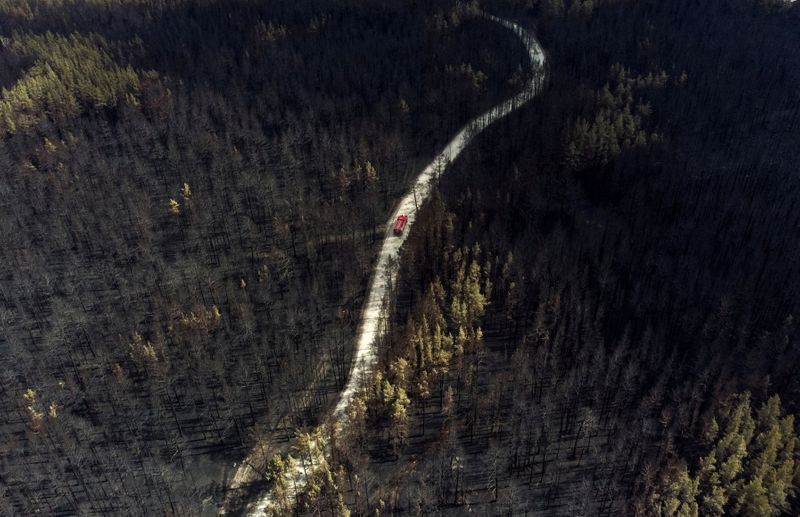By Tom Balmforth
MOSCOW (Reuters) - Russia's army sent firefighting planes on Tuesday to battle huge wildfires that have blanketed Siberian towns in thick smoke as residents complain of being suffocated in a region known for its frozen tundra that is now sweltering under a heatwave.
With flames tearing across some 800,000 hectares of Russian forest, the hardest-hit region of Yakutia in the north has been in a state of emergency for weeks as climate scientists sound the alarm about the potential long-term impact.
Fires in Russia's central Chelyabinsk region, meanwhile, last week killed one man and destroyed dozens of village homes.
"We're suffocating, our lungs are being poisoned by acrid smoke," reads one of two online petitions by Yakutia's residents addressed to President Vladimir Putin. They are asking for more equipment and forces to combat the fires.
Russia has seen its annual fire season become more ferocious in recent years, as climate change has driven unusually high temperatures across the northern Siberian tundra.
This year, temperatures have already hit new record highs.
"The fire risk has seriously flared up across practically the entire country because of the abnormal heatwave," Defence Minister Sergei Shoigu told a meeting on Tuesday. "The most difficult situation is in Yakutia."
On Tuesday, more than 2,600 firefighters were battling blazes in Yakutia, which has borne the brunt of huge forest fires in recent years.
Putin ordered the defence ministry to assist local authorities, while the army deployed several water-dropping Ilyushin Il-76 aircraft to douse the flames from the sky, Shoigu said, without specifying exactly how many aircraft were sent.
The Siberian fires have raised fears about the permafrost and peatlands thawing, releasing carbon long stored in the frozen tundra.
Meanwhile, ash from the fires could blanket nearby snow cover, turning it dark so that it absorbs more solar radiation and warms even faster.
In both 2019 and 2020, Yakutia's wildfires led to record amounts of greenhouse gases being released from the region, according to the Copernicus Atmosphere Monitoring Service (CAMS), part of an European Union observation programme.
In just the last six weeks, fires in the region have spewed out around 150 megatonnes of carbon dioxide equivalent - close to the 2017 annual fossil fuel emissions of Venezuela, said Mark Parrington, a senior scientist at CAMS.
"We're still piecing together the information to try and understand what it means for the climate," he said.
"This year we haven't yet seen so many fires within the Arctic circle within that region, but just within the last 3-4 days we've started to see a number of hotspots occurring and a lot of smoke," said Parrington.
HEATWAVE
While fires rage through forests, the country has struggled under a heatwave that has broken several temperature records in western Russia. Moscow roasted at 33.1 degrees Celsius, its hottest June 13 in 85 years.
In Siberia, the city of Yakutsk hit 35C at one point; the region's city of Verkhoyansk - seen as one of the coldest places on earth - saw temperatures of over 30C, the state weather forecast agency said.
"The temperature is really high, 8-10 degrees higher than the norm. It's really unusual for the temperature to be over 30 degrees towards the north," the agency's head of science, Roman Vilfand said at a briefing.
He said the temperature should fall in the coming 7-8 days with rain also increasing, factors that should slightly reduce the risk of new fires sparking though they might not stop existing fires from spreading.

Similar conditions in parts of Canada and the U.S. Pacific Northwest have also lead to wildfires.
"These fires will continue to happen with climate change," said Andrey Shegolev, head of WWF Russia's forest programme office, who urged more funding for local firefighting efforts. "The question in this situation is, what to do?"